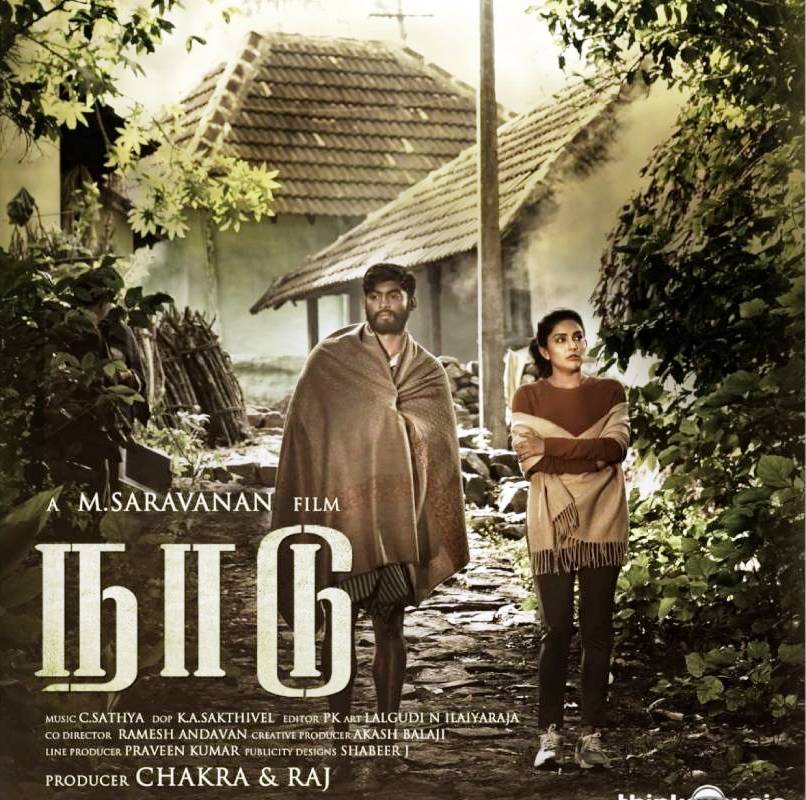A film review by Trailerman Sam

Naadu is a brilliant Tamil movie that sheds light on a relevant societal issue while it milks dry the melodrama to the hilt.
Naadu, which means country, is a film about an urban educated doctor who has been transferred to a village on a mountain top where it’s hoped that she can mitigate the frequent illnesses and diseases along her path. It also shows her efforts to get adjusted to the ways of villagers.
Simplistic in its approach in telling about a village with little or no medical help, it also shows how the villagers try to get the doctor to stay with them forever. Naadu is inspired by a real-life incident. Therefore, not surprisingly, you’ll be instantly glued to the proceedings as it starts.
In the current cinematic landscape dominated by high-octane action and thrilling plots, director M. Saravanan’s Naadu stars Mahima Nambiar (cast as Lakshmi in Chandramukhi 2 ) as Dr. Shobana and Tharshan Thiyagarajah.
This heart-warming film invites audiences to contemplate themes of national service and humanity, departing from the adrenaline-pumping narratives of its many counterparts.
The curtains opens on a deeply sombre note. In a small village, high up in the Kolli Hills, a young girl tries to kill herself. The villagers struggle to find medical help and as time fades away as well as her pulse, her brother Maari (Tharshan) is forced to run downhill, carrying her in his arms to meet halfway the already-late ambulance.
The camera then moves out to reveal the large expanse of the mountain area. We see the ambulance driving down a road that winds and winds to show how far they still have to go. With little to no dialogues at the start, the performances reflect the pain and anguish reasonably well.
Through clever cinematography, director Saravanan manages to communicate the crux of the film effectively in the opening scene. Its cinematography deserves special mention for capturing the scenic beauty of the village, providing a visual feast for the audience, unfolding like a painting, enhancing the overall cinematic experience.
Naadu raises pertinent questions like the ‘service or career’ debate that looms over the medical industry, brain drain and the need for medical professionals to understand their demography.
Thankfully, the film never attempts to know better or offer a half-boiled solution either. What it does, however, is to milk dry the melodrama and pathos ingrained in this issue.
Mahima Nambiar walks into the frame as a “city brat” doctor, somewhat oozing with snobbery, while the villagers huddle around her, almost ready to drop at her feet at any moment to stop her from leaving. The villagers also devise a number of plans to charm the doctor to make her stay. These plans range from quirky and whimsical, to downright emotional manipulation.
The film’s music scores a pivotal role in evoking emotions, occasionally bringing viewers to tears. Naadu serves as a poignant reminder of the hardship and struggle faced by those tucked away in remote corners to avail themselves of essential medical care.
Happiness is when we find ourselves rejoicing and experiencing a sense of gladness that there’s someone to help the poor and helpless. This feeling that you experience is primarily because of how the soulful story is narrated and the brilliant performances of a capable cast.
Naadu highlights several significant points about life. With a soft touch yet powerfully enough to elaborate the selfless nature of those souls isolated in remote areas, it underlines that medical care is still a distant dream to many who live on the fringes of modern day society.
For those seeking a break from the relentless action and thrillers dominating the big screen, Naadu emerges as a perfect watch.
Talking about Naadu, I have a real-life situation to report: Very soon, my front neighbour’s daughter Jostna Nanda Kumar will be doing her housemanship as a gynaecologist.
Housemanship training, also known as internship, is a period of supervised practical training that doctors must complete after graduating from medical school.
Undergoing two years of housemanship is a required internship for all prospective doctors in Malaysia. After completing housemanship, one will be eligible to practise as a qualified medical officer.
And Jostna has chosen to serve in Sabah with a remarkable quote:”Nothing is stopping me!”
Sabah, also known as “The Land Below the Wind” as it lies below the typhoon belt of East Asia and is seldom battered by typhoons, except for occasional tropical storms.
A double-salute for Jostna and the doctors who have chosen a path to serve in remote areas where survival could or could not be a pleasant word. I do hope the paths they chose would be remarkable and memorable without the presence of nasty “wet blankets” and saboteurs to derail their idealism for the betterment of this country.
Trailerman Sam writes from Lunas, Kedah. He can be contacted at trailer17@hotmal.com
WE